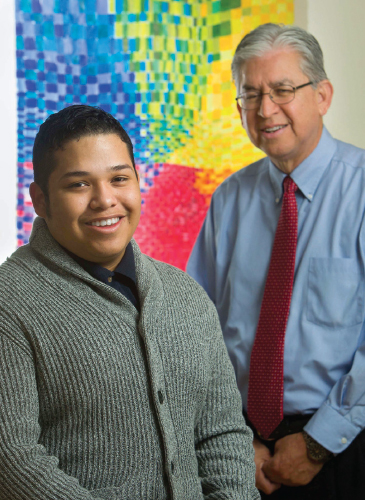Ruben Suarez turned 11 years old on the U.S. border, as his family emigrated from Mexico in search of a better life. But being the new kid in school who didn’t speak English was tough.
“It was overwhelming and frustrating, not knowing what people were saying,” Ruben said. “My mom went only to middle school, and my dad to second grade. They had expectations for me, but didn’t know how to get me there.”
Thanks to the North Carolina Society of Hispanic Professionals, headquartered in Cary, today Ruben is a college-bound senior at Millbrook High School and a member of his school’s Hispanic Leaders of Tomorrow and theater groups, and holds two part-time jobs.
His future plans include studies in international business and hospitality management.
Ruben’s transformation has come with the help of the NCSHP’s comprehensive ¡Gradúate! program, which provides bilingual, bicultural support for students and their parents. In place at Millbrook and Cary High, the program aims to help Hispanic students attain academic success.
“We meet on Tuesdays and Thursdays after school; they teach us how to write college applications and résumés, and there is tutoring,” Ruben said. “At first I had a lot of trouble with English, and they proofread my essays. They don’t do it for me — I learn my way as I go. It’s helped me a lot.”
An Investment in People
With members from various ethnic backgrounds and professional fields, the NCSHP was founded in 1999 by Marco and Susan Zarate, and other likeminded individuals.
“An investment in Hispanic students equals an investment in North Carolina,” said Marco Zarate, a native of Mexico who holds degrees in chemical and industrial engineering. “In the next 10 years, 60 percent of North Carolina’s jobs will require post-secondary education. Education is the pipeline that allows our community to build skills as part of the state’s workforce, and future professionals.”
¡Gradúate! also pairs students with a success coach.
“My coach saw potential in me and became a friend I can talk to about anything,” Ruben said. “We meet throughout the year and set short-term goals like keeping up with grades, and she gives me advice.”
Ruben’s parents are also learning via ¡Gradúate! family workshops on how to navigate the school system, communicate with teachers, and understand testing requirements.
“They work really hard, but make time to go to the sessions. I’m proud of them,” Ruben said. “My mom says the more educated you are, the less you’re a slave (to physical labor).”
Facing Challenges
While the importance of education is universal, Zarate notes that Hispanic students have particular challenges, especially those who arrive in the U.S. during the middle or high school years. Beyond the language barrier, he says a work ethic embedded in the Hispanic culture can lead parents of students who struggle academically to push their children to leave school and go to work.
Through the programs of the NCSHP, which reach families, teachers and school administrators, the scenario is improving.
The dropout rate among Hispanic students in North Carolina stood at 50 percent in 1999 when the NCSHP was founded. Now it’s at 25 percent, meaning 75 percent of Hispanic students graduate high school.
But that’s still below the state’s 2014 overall graduation rate of 83.9 percent.
“We’ve seen a lot of improvement in the achievement of Hispanic students in public schools, in the support and awareness from parents on the importance of education, and schools embracing more this segment of our population,” said Zarate.
In recognition of his work in developing these first-ever educational programs for North Carolina’s Hispanic students, Zarate was awarded the prestigious Ohtli award in 2013 by the Consul General of Mexico in the Carolinas.
Among members sharing in the society’s advocacy efforts are Zarate’s wife, Susan, who teaches English as a Second Language classes at Cary High, and Brienne Pasick, director of the NCSHP and its only full-time employee.
A Triad chapter of the NCSHP was formed in 2013.
Unique Nationwide
Unique nationwide, the NCSHP model includes the first statewide Stay in School campaign, science-focused Good Stewards of the Environment program, and one-on-one mentoring and tutoring.
The Hispanic Achievement Conference and Student Achievement Workshop Series offers perspective for teachers and school administrators, while the NCSHP’s largest event is the annual Hispanic Educational Summit for students, this year set for March 27.
It features renowned keynote speakers, educational exhibits and dozens of sessions led by Hispanic and non-Hispanic professionals on disciplines from education and career planning to life skills.
The summit is Zarate’s favorite NCSHP program; it has served 11,000 children since its inception in 2000.
“They come with hope about their future,” he said, with a catch in his throat. “The students give too, $1 each to our scholarship fund (the N.C. Hispanic College Fund). We can see the fruits of our efforts, and it is tremendously rewarding.”
Ruben is among these successes.
“I would tell other students, ‘Sign up for ¡Gradúate! You won’t regret it,’” he said. “You will see everything the society does, and it will benefit you in ways you don’t even know yet.
“As for me, I will become someone important, who helps my community,” Ruben said. “I know I will get there.”
The North Carolina Society of Hispanic Professionals, Cary
(919) 467-8424
thencshp.org and graduatenc.org






